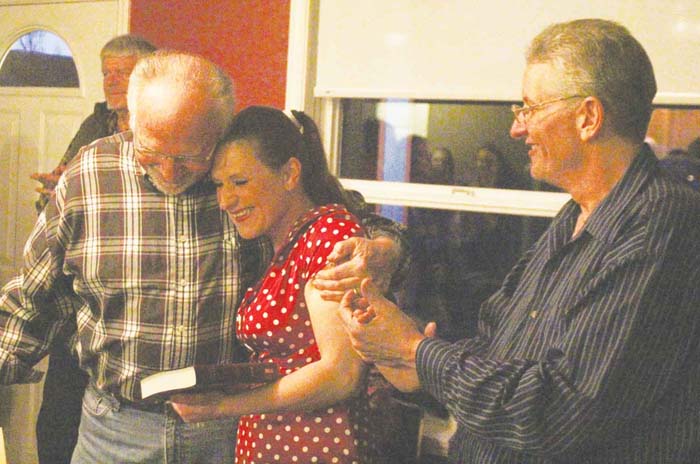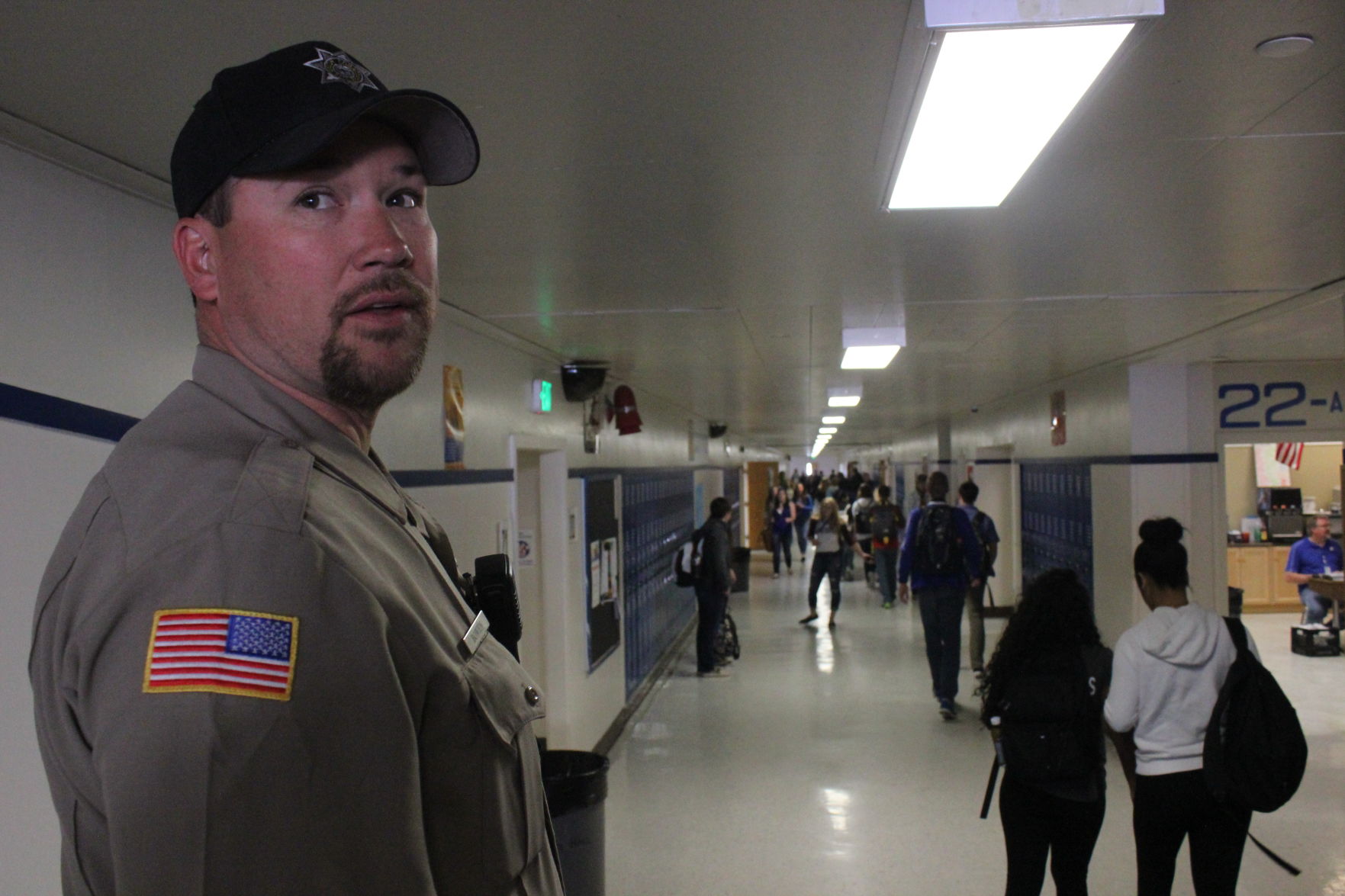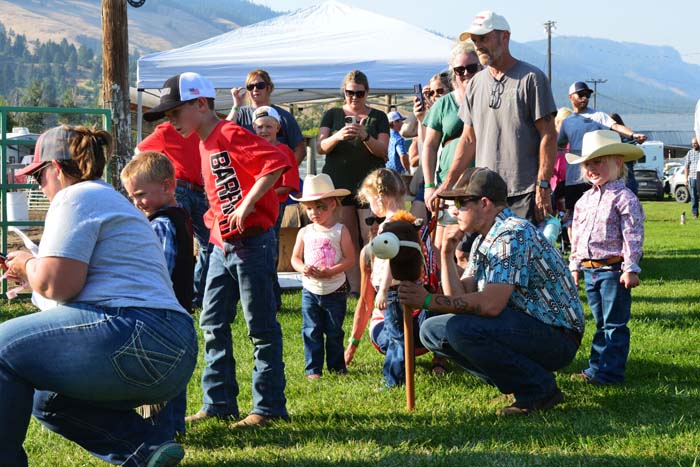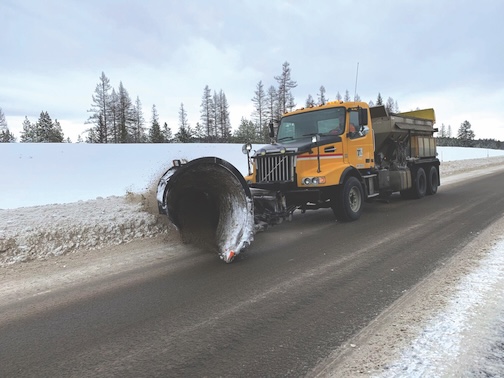Grande Ronde Valley Habitat for Humanity facing the future
Published 7:00 am Tuesday, October 31, 2023

- Grande Ronde Valley Habitat for Humanity President Lonnie Lester, left, celebrates with Marcy Spry, center, and Scott Roshon in 2015 as the organization officially hands over the keys to their new home, which they helped build.
LA GRANDE — The Grande Ronde Valley Habitat for Humanity affiliate is a volunteer-operated nonprofit organization that has diversified its services to benefit a broader population of the community.
Trending
But like so many other nonprofits, the future of the organization’s altruistic work is dependent on recruiting younger volunteers.
Building homes for needy families has been the hallmark work of Habitat for Humanity, and the local program benefits one family every few years. However, the local HFH chapter has gradually expanded its community outreach to help many more through their local ReStore, which is supported by community shoppers, and through its charitable local program called Brush with Kindness.
Leading the Grande Ronde Valley HFH today is its president, Lonnie Lester, 80, of rural La Grande, who joined the board of directors in 2011 at the invitation of the organization’s then-president David Still. In retrospect, he described his own journey on a path of satisfying volunteerism.
Trending
“A good friend of mine, David Still, called me when I retired and wanted to know if I would be on the HFH board,” Lester said. “I was interested in Habitat, and I volunteered to work on a building committee when they were building a house, but serving on the board — well, I wasn’t so sure about that.”
Despite his initial hesitation about getting involved at that level now that he was finally retired, he did attend a board meeting at the urging of his friend, “and I’ve been there ever since,” he said.
At first, Lester felt that a member of the board of directors ought to have a construction background, and he admitted his experience building homes was limited. “What I picked up in construction, I picked up working on a Habitat home project, working with experienced construction workers and following their instructions,” he said.
His job history was not in construction, but he did work in home sales and closings. In the 1970s, Lester owned and operated Lester Mobile Homes with his brother-in-law, Bill Shaw, and then he worked as a real estate agent for Lester Real Estate. Following that he moved over to Eastern Oregon Title as a closer and managed the business for the last several years until retirement in 2010.
So, when Still invited him to get more involved with Habitat, Lester had to admit he didn’t really know much about how the organization was governed or what the board of directors did. He wasn’t sure how much time this commitment would ask of him, but he was willing to check it out.
“After a while, I realized that every organization has a group of hard-working people who run it, and I accepted that and joined in 2011,” he said.
Since then, as a board member and then president, Lester has put in at least 25 volunteer hours a month on various duties, including continuing to serve on the committee that searches for available lots on which to build HFH homes. With the inflated cost of real estate, this has become increasingly challenging. The desire and dedication of the board is there, but building houses requires finances and volunteers that aren’t easy to come by.
The ReStore
To raise money for a Habitat home, Grande Ronde Valley HFH relies heavily on the income earned through the ReStore, 2304 E. R Ave. (behind McDonald’s) in La Grande. The store was opened in the fall of 2007 and its hours are 10 a.m. to 4 p.m. Tuesday through Saturday. In addition to a variety-filled thrift shop, which also sells furniture, there is a separate store offering building materials, from light fixtures and hinges to flooring, cabinets, sinks and doors.
The local HFH affiliate rents the property where the ReStore is located, and it pays two employees to manage its necessary business operations. The rest of the store’s operation is performed by volunteers, and Lester said they need more volunteer workers there.
“We have a lot of stuff you can’t find elsewhere,” Lester said. “People donate things from their garages, or when they sell or move or someone dies, they bring things into the ReStore.”
At a time when building materials come at a premium price, the ReStore sells quality used and surplus building materials at a greatly reduced price. Donations are received from building supply stores, contractors and individuals.
The ReStore draws in a lot of repeat shoppers who keep tabs on the store’s inventory for things they want for a home project, Lester said. The discounted prices make the store a great first stop to shop when searching for home building materials.
Brush with Kindness
Another way the Grande Ronde Valley Habitat for Humanity serves the community is through its Brush with Kindness program. This local program was started in 2015 to help qualifying residents with small construction projects at their homes, in particular, wheelchair ramps, steps and porch hand railings.
“The program is designed to help those who can’t afford a contractor to build those things. Then we will go out and build it for them, so they can remain living at home and not have to move into an assisted living facility,” Lester said.
Brush with Kindness is manned by volunteer laborers, like Lester, and the people who are helped are required to pay HFH back for the materials, in payments their budget will allow.
“We have two or three senior volunteers who make themselves available to work for a day or so, and that’s one of the challenges we have now — all the volunteers are reaching their 80s, and they are serving people younger than they are,” Lester said.
To apply for that kind of assistance, the applicant must contact HFH and identify their building need and show they meet program qualifications. “There are lots of people who survive on $2,000 a month,” Lester said, “and so we make a home visit, and then we can see what they need.”
Most people who are served through Brush with Kindness are elderly or disabled, including veterans who have physical problems from their time in the military. The program has assisted more than 15 families a year on average. Boise Cascade has helped as well by donating plywood for all the ramps that the volunteers build.
“When COVID hit, the Brush with Kindness building projects slowed down a little bit, but in 2022 we helped about 12 families,” Lester said. “Prior to the pandemic, there was a year when volunteers helped 22 families.”
Challenges
The needs of recipients in this program do put quite a load on the two or three no-longer-young regular construction volunteers.
“Regardless, it is a good feeling to finish a ramp and see the householder use it and get in and out of their home. It’s satisfying,” Lester said.
Due to the thinning ranks of volunteers, Lester is also filling in as the interim Brush with Kindness program director, subbing for the individual who had to step down due to advanced age and health issues. This is a recurring challenge for the HFH organization. Ideally, Lester said they need a volunteer who is dependable and who can respond on short notice and spend one or two days on a small building project for Brush with Kindness.
“We’re like all nonprofits. We’re really hurting for volunteers,” Lester said. “We need them on the board, at the ReStore and in our Brush with Kindness program.”
Lester believes the lack of volunteers centers around the issue of time. People who work during the week are not sure how much of their weekend they want or are able to give to a volunteer program. Another factor that impacts volunteerism is that people have so many other interests that demand their time. Consequently, nonprofits like Habitat for Humanity have an aging volunteer staff and their numbers are dwindling.
Brush with Kindness would, however, make a great senior project each summer for a high school senior familiar with woodworking. The student would have to be able to respond quickly to a call, Lester said, but it is a possible fit for both the student and the local program. It would also be a good fit for a retired person, but Lester said that commitment and dependability are required traits in any volunteer.
Inflation
Grande Ronde Valley Habitat for Humanity tries to build a home every three years, but due to the pandemic, the last house was built in 2015. Lester said that funds are gradually being raised in preparation for the next building project.
Once funds are raised, the selection committee will let the public know they are open for applications. The application period lasts about two months, at which time the committee selects the family. No construction begins until after the family is selected and it is ascertained what specs the family needs in their house. The family is also required to assist in the construction process.
The cost for HFH homes are increasing with inflation.
“Our last house we built was in a subdivision, and it cost over $90,000 to build,” Lester said.
Inflation has posed a disappointing challenge for HFH home applicants.
“With the increased price of lumber, it starts getting more expensive, and it eliminates the number of families that can afford to repay us for materials over a 25-year period,” Lester said.
The last local Habitat home was a five-bedroom, one-level house. Grande Ronde Valley HFH carries the loan for these families, but they must make monthly payments to HFH to repay material costs and necessary licensed tradesmen’s fees.
Grande Ronde Valley HFH does not charge the applicant interest on the loans. However, some of the bigger Habitat affiliates are no longer carrying loans for families. Instead, Lester said, they have resorted to working with low interest government loan programs.
Lester doesn’t want to change the original intent of the Habitat home building program.
“We’re still under the old system where there is no interest added to the loan, and we’re going to stay that way,” he said.
For Lester, the future of Grande Ronde Valley Habitat for Humanity hinges on several factors: keeping loans affordable, rebuilding a volunteer labor force, and remaining sustainable through donations and the ReStore.
“It takes volunteers who are dedicated and who are in fairly good health,” he said. “They must be committed and dependable to the cause.”
To donate so that the funds directly benefit the La Grande affiliate, monetary donations should be made out to Grande Ronde Valley Habitat for Humanity and mailed to P.O. Box 111, La Grande, OR 97850. For more information or to volunteer, call Lonnie Lester at 208-340-2921.









